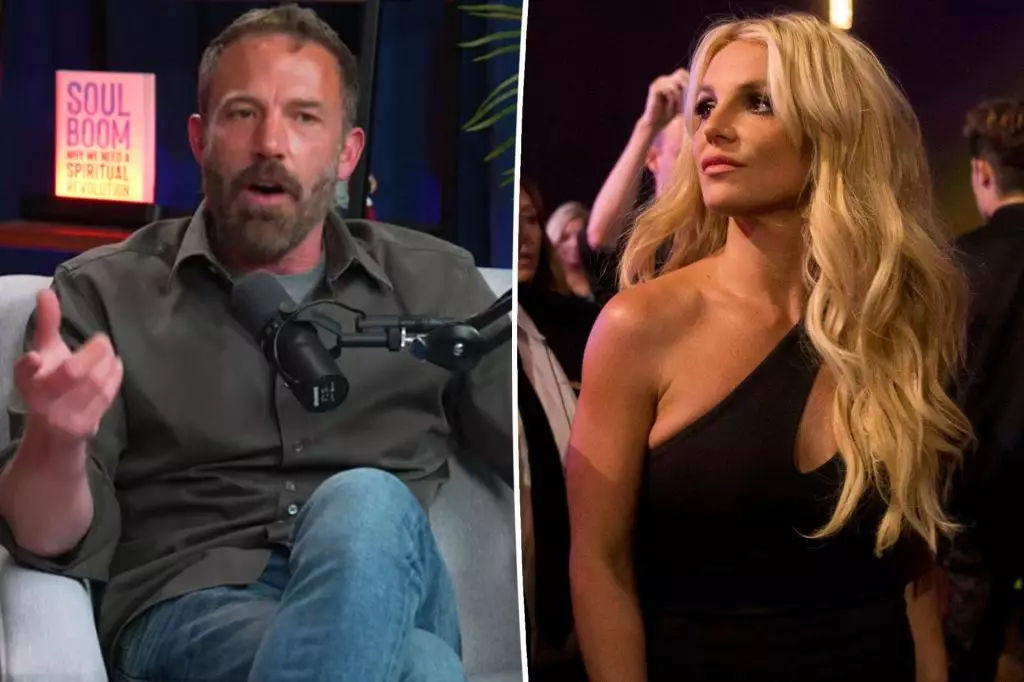In an era dominated by social media and constant surveillance, celebrity lives can often resemble reality TV shows, complete with dramatic plot twists and public scrutiny. Ben Affleck recently opened up about his past feelings of empathy towards Britney Spears amid the paparazzi frenzy surrounding her during some of the most tumultuous times of her career. Speaking on the podcast “This Past Weekend With Theo Von,” Affleck painted a grim picture of the relentless harassment Spears endured from the media and fans alike when her struggles became tabloid fodder. His reflections raise critical questions about compassion and societal responsibility in the face of public figures’ private battles.
Affleck’s admission underscores a broader cultural problem where the line between celebrity admiration and human decency has blurred. When public figures like Spears find themselves at their lowest, the world can sometimes turn into the notorious “mob with pitchforks,” gleefully feeding off the drama without considering the human cost. Affleck, at 52, expressed an understanding of how the churn of celebrity news can escalate into a cruel spectacle, an aspect many often overlook. His comments prompt a reflection on how culture can dehumanize individuals under public scrutiny, exacerbating their distress rather than providing support or understanding.
A Critical Lens on Collective Cruelty
The actor articulated a phenomenon he describes as “collective cruelty,” a term that encapsulates the societal tendency to revel in another’s misfortune while neglecting the empathy these individuals desperately need. The imagery of the “growling animal” that Affleck evokes illustrates this point disturbingly well: the public only sees the tantrum or breakdown without awareness of the factors that contribute to it. In those moments, antagonistic behavior from paparazzi can feel like poking a caged animal, encouraging reactions that become fodder for sensational headlines.
This perspective is particularly poignant when viewed through the lens of Spears’ infamous 2007 breakdown, which, for many, was less a narrative of personal struggle and more an entertainment spectacle. The media’s relentless barrage included not just cameras, but also a public poised to judge and criticize. Affleck’s comments shed light on the importance of understanding the psychological ramifications of such constant scrutiny, especially when one is facing personal crises that may not be visible to the public eye.
Celebrity and the Question of Authenticity
In an unexpected twist, Affleck also touched upon his own past connection to Spears, reminiscing about an alleged make-out session that surfaced recently due to Spears’ Instagram post. While the nature of their relationship—whether founded in reality or a blend of shared celebrity moments—remains ambiguous, it highlights an essential truth: the personal narratives shared by celebrities often intersect in unpredictable ways, adding layers of complexity to their public personas.
For many, the fascination with such anecdotes blurs the lines between public interest and genuine liking for the individual behind the fame. The desire for authenticity in celebrity culture, coupled with the relentless pressure to maintain an image, comes with its burdens. As Affleck deftly navigated a question about this alleged encounter, it speaks to the fatigue that many public figures experience in managing their identities—both in and out of the public eye.
The Road to Healing Through Empathy
Affleck’s reflections on Spears serve as a potent reminder of the need for empathy in a world increasingly detached from the humanity of others. His insights compel both the media and the public to reevaluate their roles in the lives of those they idolize. Can society do better? Is it possible to cultivate an environment where empathy takes precedence over sensationalism?
As discussions regarding mental health continue to evolve, stemming from the abyss of public spectacle that Spears once faced, the way forward involves recognizing that empathy can be a powerful tool against the tide of collective cruelty. By shifting our lens towards understanding rather than judgment, the hope remains that future generations of celebrities might navigate their careers with a little less fear and a lot more compassion from the world around them. It may be a tall order, but if Affleck’s nostalgic reflections serve any purpose, it’s to remind us that compassion should always triumph over cruelty in the landscape of fame.

